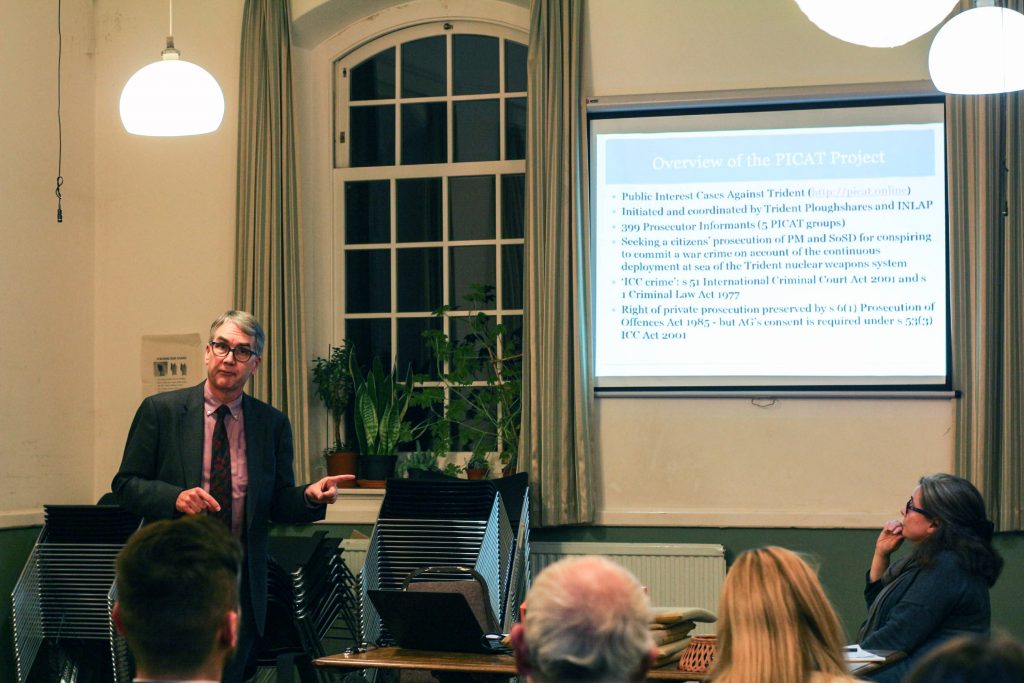Kent Law School Professor Nick Grief delivered the first lecture of this academic year’s ‘CeCIL in Canterbury’ series with a fascinating talk on ‘Trident and the Law: Will the Prime Minister and Defence Secretary be Prosecuted for Conspiracy to Commit a War Crime?’
Beginning in 2016, the ‘CeCIL in Canterbury’ lecture series is a project of public engagement whereby Kent Law School academics present aspects of their research on current international affairs as a means of fostering dialogue within the broader Canterbury community. This engagement is made possible by the Friends Meeting House who generously provide a space where this discussion can take place. Nick’s talk was fantastically well-attended by a diverse array of individuals including Kent students and staff, members of the local community, and legal practitioners from near and far.
Here Nick detailed his legal work with the Public Interest Cases Against Trident (PICAT) project that is dedicated to challenging the legality of Trident, Britain’s nuclear weapons system. In doing so Nick’s team advanced a novel legal argument that, when read in conjunction, the UK’s 2001 domestic implementation of the Rome Statute of the International Criminal Court and the Criminal Law Act of 1977 impose liability for ‘conspiracy to commit a war crime.’ According to Nick, the UK’s Prime Minister and Secretary of Defence are possibly in breach of this criminal prohibition due to their continuous operation of Trident. In terms of actually bringing this case, Nick focuses on the role of private prosecutions whereby private individuals bring actions to enforce public law against state actors. However, these actions are subject to consent of the Attorney General and, as Nick astutely pointed out, the decision to give or withhold consent exposes the particular position of the Attroney as something between that of a politician on the one hand, and the chief legal advisor to the Crown on the other.
While the Attorney General did not give consent in this particular case, and did so without substantive explanation, for Nick, there is still the possible question of seeking a judicial review of its withholding. This move might at least force the Attorney General to provide more detailed reasoning as to why consent was denied. However, seeking such an action raises the possible issue that this move may be struck down on the grounds that it presents unjustifiable issues of defence and foreign policy that exceed the competence of the court system and is best left to the more political government actors. Yet, despite the weight of this challenge, Nick discussed other possible points relating to the UK international criminal law obligations with respect to its status as a Rome Statute signatory. After all, what does membership in this organisation mean if a state can implement a mechanism that makes its possible breaches unreviewable? For Nick, this may even invoke the International Criminal Court’s principle of complimentarity whereby international crimes are to be addressed at the domestic level, unless local actors prove unable or unwilling to do so.
Such issues certainly raise many strategic questions for how Nick and his team should proceed. Here a risk is that seeking a judicial review for such a controversial case might lead to a ruling that closes the door to a whole range of future private prosecution actions. These are very real considerations and even the most idealistic advocate cannot afford to ignore them. Yet, regardless of what the outcome may be in light of all this, one thing for sure is that Nick’s work in this capacity raises many important issues and has certainly given all of us who had the pleasure of hearing his talk many things to contemplate.

